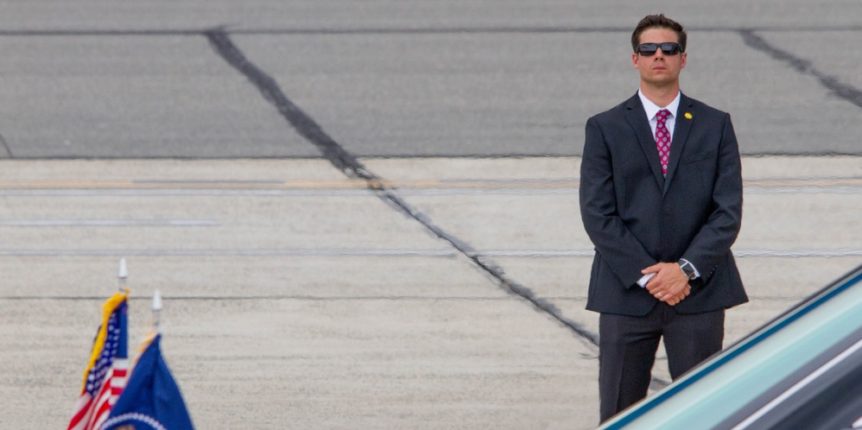You’ve seen them in the movies. The dapper agents in crisp black suits, dark sunglasses, fancy earpieces, and a stoic superhero demeanor. You can tell they mean business—their mission: To guard the President and his family against any potential threat.
But, the mandate of the US Secret Service goes beyond what is usually depicted on TV. The agency employs more than 3,000 special agents, over 1,000 officers of the Uniformed Division, and more than 2,000 professional, administrative, and technical support personnel.
What does the US Secret Service do, and who do its agents report to? Here’s everything you need to know.
When Was the Secret Service Created?
The Secret Service history dates back to 1865, making it one of the country’s oldest federal law enforcement agencies. It was originally created as an investigative branch of the US Treasury Department to combat counterfeiting, which was running rampant at the time. It was such a huge problem that an estimated 33-50 percent of the currency in circulation was believed to be counterfeit money.
Following President William McKinley’s assassination in 1901 in Buffalo, New York, the Secret Service’s mission expanded to include providing protection to the President, Vice President, and their families.
What Does the Secret Service Do
The US Congress tasked the Secret Service with two critical and distinct missions: To protect the country’s leaders and keep the nation’s critical and financial infrastructure safe. Here’s a detailed look into the agency’s two primary mandates.
Protective Mandate
The Secret Service’s protective mission involves working with local and state law enforcement personnel in the coordination of logistics and manpower, conducting advance venue and site assessments for protectees, and carrying out intelligence operations to identify and investigate all potential risks they may be exposed to.
It’s also important to note that the Secret Service is the lead agency charged with the planning, coordinating, and executing of National Special Security Events (NSSE). Part of its mission revolves around the prevention of incidents before they occur, reliance on the rigorous threat assessments developed by the agency’s Intelligence Division to identify, eliminate, or mitigate all potential risks for the ultimate safety of the individuals they are supposed to protect.
Who Does the Secret Service Protect
The law authorizes the Secret Service to protect:
- The President and Vice President of the United States
- The President-elect, Vice President-elect, or any other individual next in line for succession to the Office of the President
- The immediate families of the individuals listed above
- Major candidates for the presidency and vice presidency in a general election and their spouses for the 120 days leading up to the election date
- Former presidents and their spouses except when any of their spouses remarry
- The children of former presidents up until they turn 16 years of age
- A visiting head of a foreign state or government and their spouse traveling with them
- Any distinguished foreign visitor to the United States
- Any official representative of the US on special missions duty abroad
- Any other individual designated by way of a presidential executive order
- Any event designated as an NSSE by the Secretary of the Department of Homeland Security
In 1994, Congress enacted a law that required former presidents who held office before January 1, 1997, to receive Secret Service presidential detail for the rest of their lives. On the other hand, presidents who held office after that date would receive protection for a maximum of 10 years after leaving office.
Investigative Mandate
In addition to its protective mission, the US Secret Service also has an investigative mandate that centers on safeguarding the nation’s financial and payment systems from cyber-based crimes and all manner of financial crimes.
The Secret Service investigates:
- Counterfeiting of US currency and any other government obligation
- Theft or forgery of US Treasury securities, including bonds and checks
- Telecommunications fraud
- Credit card fraud
- Computer fraud
- Identity theft or fraud
- Crimes that affect federally-insured financial institutions
The Secret Service and Cyber Crime

An increasing number of Secret Service agents and specialists are stationed in field offices worldwide to curb financial crimes, many of which are perpetrated via cyberspace. While the agency’s investigations are designed to address counterfeiting of the US currency, the focus of its investigative work has shifted to address banking fraud, wire fraud, credit card fraud, ransomware, network intrusions, and internet-enabled financial crimes.
The Secret Service’s Cyber Fraud Task Forces (CFTFs) were created in partnership with other law enforcement agencies, state and federal prosecutors, academia, and private industry players to detect, investigate, prevent, and mitigate cybercrime.
The agency also set up an integrated Global Investigative Operations Center (GIOC) to monitor, coordinate, and support strategic local and international investigations into activities that threaten the integrity of the country’s financial infrastructure. The GIOC analyses both traditional and non-traditional sources of data and works collaboratively with various CFTFs to combat transnational organized criminal associations.
The cybercrimes that the Secret Service investigates include:
- Access device fraud – The illicit transfer of funds involving credit cards, debit cards, or other devices that provide access to financial accounts
- ATM attacks – Involves network breaches and the manipulation of access devices
- Business email compromise – The compromise of legitimate business emails to conduct unauthorized or illicit wire transfers
- Identity theft – The illegal theft and use of personally identifiable information for monetary gain
- Money laundering and illicit financing activities – The investment of illicit monies in an attempt to disguise them as legitimate proceeds
- Point-of-Sale system compromise – The unauthorized access to cashier or checkout systems that rely on electronic payment transfers for products and services
- Ransomware – Malicious software (malware) designed to lock users out of computers or networks until a ransom is paid to restore access
Who Does the Secret Service Report To
The US Secret Service is a federal law enforcement agency. It is maintained as a separate entity within the Department of Homeland Security. Its functions and operations are not and cannot be merged with any other functions of the Department.
Secret Service agents report to the Director of the US Secret Service, who, in turn, reports directly to the Secretary of Homeland Security.
Are you grappling with a legal issue you need advice on? Chat online with a Laws101 attorney right now.
